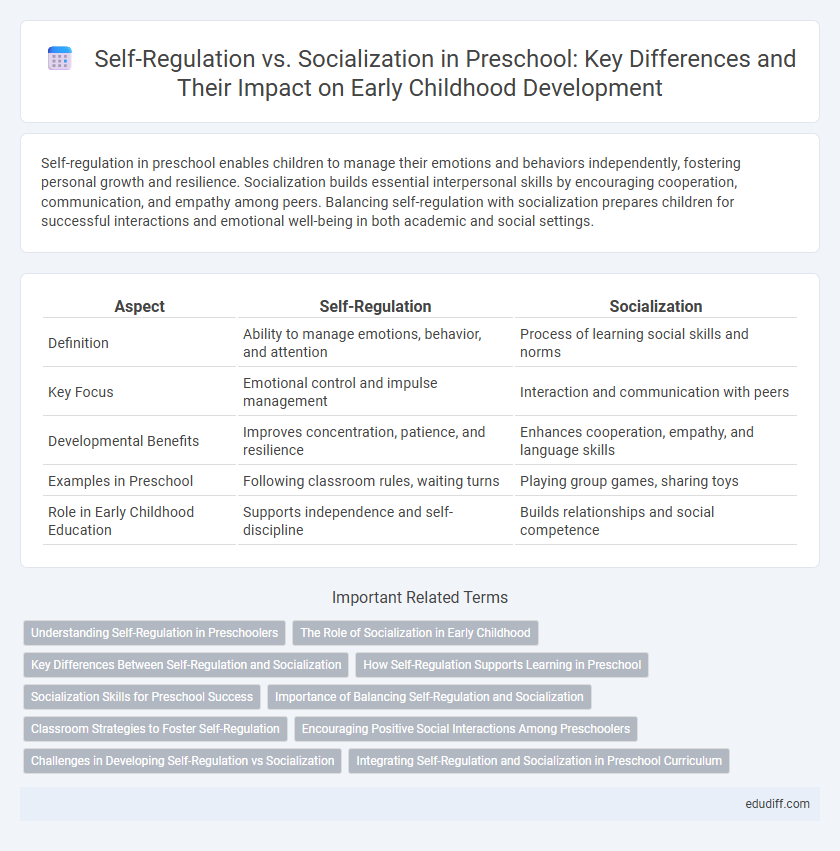Self-regulation in preschool enables children to manage their emotions and behaviors independently, fostering personal growth and resilience. Socialization builds essential interpersonal skills by encouraging cooperation, communication, and empathy among peers. Balancing self-regulation with socialization prepares children for successful interactions and emotional well-being in both academic and social settings.
Table of Comparison
| Aspect | Self-Regulation | Socialization |
|---|---|---|
| Definition | Ability to manage emotions, behavior, and attention | Process of learning social skills and norms |
| Key Focus | Emotional control and impulse management | Interaction and communication with peers |
| Developmental Benefits | Improves concentration, patience, and resilience | Enhances cooperation, empathy, and language skills |
| Examples in Preschool | Following classroom rules, waiting turns | Playing group games, sharing toys |
| Role in Early Childhood Education | Supports independence and self-discipline | Builds relationships and social competence |
Understanding Self-Regulation in Preschoolers
Self-regulation in preschoolers involves the ability to manage emotions, control impulses, and maintain attention during activities, essential for successful learning and social interactions. Developing these skills supports better socialization by enabling children to follow rules, share, and cooperate with peers in preschool settings. Early support through structured routines and positive reinforcement enhances self-regulation, promoting emotional resilience and peer relationship building.
The Role of Socialization in Early Childhood
Socialization plays a crucial role in early childhood by helping preschoolers develop essential self-regulation skills such as impulse control, emotional understanding, and cooperative behavior. Interactions with peers and adults in preschool environments provide opportunities for children to practice sharing, empathy, and conflict resolution. These social experiences promote cognitive and emotional growth, laying the foundation for positive relationships and success in later stages of development.
Key Differences Between Self-Regulation and Socialization
Self-regulation in preschool refers to a child's ability to manage emotions, behaviors, and attention to achieve goals, while socialization involves learning to interact and communicate effectively with peers and adults. Key differences lie in self-regulation's internal focus on impulse control and emotional management, contrasted with socialization's external focus on developing social skills, cooperation, and understanding social norms. Effective preschool programs balance both areas, fostering children's independence alongside their ability to build positive relationships.
How Self-Regulation Supports Learning in Preschool
Self-regulation in preschool enhances cognitive and emotional development by enabling children to manage impulses, focus attention, and persist through challenges. This skill supports learning by improving memory retention, fostering problem-solving abilities, and promoting effective interaction with peers and teachers. Strong self-regulation lays the foundation for academic success and positive social behaviors essential in early childhood education settings.
Socialization Skills for Preschool Success
Developing socialization skills is crucial for preschool success, as children learn to communicate, share, and collaborate with peers in structured group settings. These skills foster emotional intelligence, empathy, and conflict resolution, enabling children to build positive relationships and navigate social environments effectively. Enhancing socialization in preschool supports academic readiness and long-term personal development by encouraging cooperative learning and self-expression.
Importance of Balancing Self-Regulation and Socialization
Balancing self-regulation and socialization in preschool is critical for fostering emotional intelligence and peer relationships. Effective self-regulation skills enable children to manage impulses and emotions, enhancing their ability to engage positively in group interactions. Promoting this balance supports cognitive development and prepares children for successful academic and social experiences.
Classroom Strategies to Foster Self-Regulation
Classroom strategies to foster self-regulation in preschool emphasize consistent routines, clear expectations, and engaging activities that promote emotional awareness and impulse control. Techniques such as using visual schedules, modeling calm behavior, and incorporating mindfulness exercises help children develop the ability to manage their emotions and behaviors effectively. These strategies support children's independence and readiness for social interactions, creating a balanced environment where self-regulation enhances socialization skills.
Encouraging Positive Social Interactions Among Preschoolers
Encouraging positive social interactions among preschoolers enhances both self-regulation and socialization skills critical for early childhood development. Strategies such as guided play, role-playing, and conflict resolution exercises foster cooperation, empathy, and emotional control, creating a supportive classroom environment. Research from the National Association for the Education of Young Children (NAEYC) highlights that these approaches reduce behavioral issues while promoting pro-social behavior and peer relationships.
Challenges in Developing Self-Regulation vs Socialization
Preschool children face significant challenges in developing self-regulation, including difficulties managing emotions, impulses, and attention, which are essential for successful learning and interaction. Socialization challenges often arise from limited language skills and understanding of social norms, making cooperative play and conflict resolution more complex. These developmental hurdles can impact a child's ability to adapt behaviors appropriately in group settings, highlighting the need for targeted strategies to support growth in both areas.
Integrating Self-Regulation and Socialization in Preschool Curriculum
Integrating self-regulation and socialization in preschool curriculum enhances children's emotional control and interpersonal skills simultaneously, fostering a balanced development. Techniques such as guided play, role-playing, and structured group activities encourage young learners to manage impulses while cooperating with peers, promoting both individual and social growth. Evidence from early childhood education studies shows that combined focus on self-regulation and socialization leads to improved academic readiness and long-term behavioral outcomes.
Self-regulation vs Socialization Infographic

 edudiff.com
edudiff.com